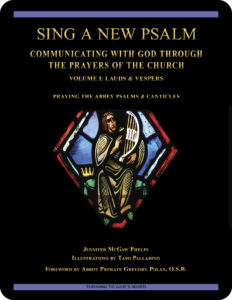 Sing a New Psalm:
Sing a New Psalm:
Communicating with God Through
the Prayers of the Church
Volume I: Lauds & Vespers
Lesson 13 Our Help Is in the Name of the LORD
Psalm 41, Psalm 124, Psalm 129, and Psalm 130
Friday Vespers (Week I)
Revised Standard Version Catholic Edition (RSVCE)*
New American Bible Revised Edition (NABRE)*
Catechism of the Catholic Church
ex libris (in our library)
next lesson: Majesty Set Above the Heavens
This material coordinates with Lesson 13 on pages 54–57 in Sing a New Psalm: Communicating with God Through the Prayers of the Church—Volume I: Lauds & Vespers. Our Catholic Bible study is based on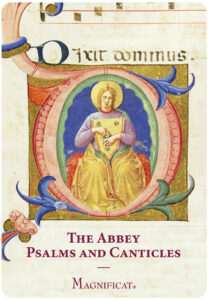 The Abbey Psalms and Canticles, an English translation of the Psalms prepared by the monks at Conception Abbey in 2010 and first published as The Revised Grail Psalms. The Abbey Psalms and Canticles is a revision of that work, finished in 2020 and published by the United States Conference of Catholic Bishops (USCCB). Wording and numbering of some Psalms and verses in other translations may differ. This new translation of the Psalms in the process of being added to all English-language Liturgy of the Hours books used in the United States. The USCCB also plans a liturgical Bible based on the NABRE translation.
The Abbey Psalms and Canticles, an English translation of the Psalms prepared by the monks at Conception Abbey in 2010 and first published as The Revised Grail Psalms. The Abbey Psalms and Canticles is a revision of that work, finished in 2020 and published by the United States Conference of Catholic Bishops (USCCB). Wording and numbering of some Psalms and verses in other translations may differ. This new translation of the Psalms in the process of being added to all English-language Liturgy of the Hours books used in the United States. The USCCB also plans a liturgical Bible based on the NABRE translation.
“Unlike other prayers in sacred Scripture, the prayers contained in the Psalms are not inserted into a narrative story that specifies their meaning and function. Instead, the Psalms are given to the believer precisely as a text of prayer. Since they are the Word of God, the believer who prays the Psalms speaks to God using the very words that God himself has given to us. Thus, in praying the Psalms we learn to pray. The Psalms are a school of prayer.”—Pope Benedict XVI
welcome to our in-depth study of the Psalms
We invite groups and individuals to check out the sample first lesson from this 28- lesson Turning to
lesson Turning to  God’s Word Catholic Bible study. Our online study pages include additional questions, commentary, and prayers based on the Psalm texts. Sing a New Psalm: Communicating with God Through the Prayers of the Church—Volume I: Lauds & Vespers has been granted an imprimatur. A digital version of this study can be purchased from our website shop. Volume II: Vigils, Day Prayer & Compline is scheduled for publication in 2025. If you have a Bible-related question or comment, click on one of the “ask us your question” or “what do you think” buttons on any online study page.
God’s Word Catholic Bible study. Our online study pages include additional questions, commentary, and prayers based on the Psalm texts. Sing a New Psalm: Communicating with God Through the Prayers of the Church—Volume I: Lauds & Vespers has been granted an imprimatur. A digital version of this study can be purchased from our website shop. Volume II: Vigils, Day Prayer & Compline is scheduled for publication in 2025. If you have a Bible-related question or comment, click on one of the “ask us your question” or “what do you think” buttons on any online study page.
open with prayer
It’s always wise to begin any Bible study with prayer, whether reading the Scriptures alone or meeting with others in a discussion study group. You can pray using your own words, pray one of the Psalms in this lesson, or use one of the opening prayers on our website. We especially like the following:
Lord Jesus, you promised to send your Holy Spirit
to teach us all things.
As we read and study your word today,
allow it to touch our hearts and change our lives. Amen.
the name of the LORD can be seen as well as heard
Tami Palladino, Turning to God’s Word co-founder, created the illustration for this lesson from titles for 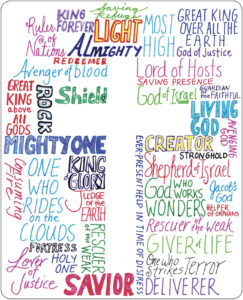 God found in the Psalms, and it reflects the lesson title—”Our Help Is in the Name of the LORD.” Tami relied on the use of white space to connect these Old Testament titles of God with the New Testament sacrifice of God’s Son, Jesus, something that’s readily apparent even in the thumbnail version of her illustration. In Psalm 124, consider what expectations the Psalmist might have about how the name of the LORD can help him. What might make the LORD’s name carry so much power? When in the past have you consciously called upon the name of the LORD? What situation in your life right now might improve if you called upon the name of the LORD? Which of God’s titles best fits what you know about God’s current action in your own life? Click on Tami’s illustration (right) to enlarge it. Her original illustration is on page 55 in Sing a New Psalm: Communicating with God Through the Prayers of the Church—Volume I: Lauds & Vespers.
God found in the Psalms, and it reflects the lesson title—”Our Help Is in the Name of the LORD.” Tami relied on the use of white space to connect these Old Testament titles of God with the New Testament sacrifice of God’s Son, Jesus, something that’s readily apparent even in the thumbnail version of her illustration. In Psalm 124, consider what expectations the Psalmist might have about how the name of the LORD can help him. What might make the LORD’s name carry so much power? When in the past have you consciously called upon the name of the LORD? What situation in your life right now might improve if you called upon the name of the LORD? Which of God’s titles best fits what you know about God’s current action in your own life? Click on Tami’s illustration (right) to enlarge it. Her original illustration is on page 55 in Sing a New Psalm: Communicating with God Through the Prayers of the Church—Volume I: Lauds & Vespers.
the Divine Praises
Many Catholics are familiar with the Divine Praises, which incorporate God’s holy name and often are recited following Benediction with the Blessed Sacrament. This litany may be prayerfully recited at any time, however. Not all Catholics realize that the Divine Praises were written with the specific purpose of serving as reparation for blasphemy and profane language. One Catholic we know is in the habit, when others take the Lord’s name in vain, of immediately responding with “Blessed be God,” the first words of the litany. Another person recites the first two praises—”Blessed be God; blessed be his holy name”—when tempted to utter profanities. The entire litany can be found on page 54 in Sing a New Psalm: Communicating with God Through the Prayers of the Church—Volume I: Lauds & Vespers. Consider some ways in which you might include the Divine Praises in your prayer life.
 name—you could look it up in our archives
name—you could look it up in our archives
Psalm 124 addresses issues relevant to the power of God’s name. To learn more about the significance that Old Testament men and women associated with a name, read Lost in Translation, an online column in which Turning to God’s Word author Matthew Phelps helps readers connect with ideas expressed in the original languages of the Scriptures. New Lost in Translation entries are posted on Mondays, and past entries are archived on our website. Contact us if you’d like to receive Lost in Translation by email every week.
ex libris—hallowed be God’s name
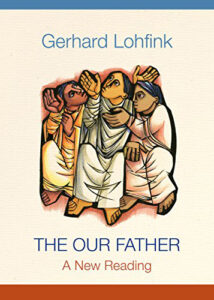 While the Our Father is recited at every Mass, only a few Catholics give much thought to what that phrase means. The language—even if we substitute “your
While the Our Father is recited at every Mass, only a few Catholics give much thought to what that phrase means. The language—even if we substitute “your  name” for “thy name”—can seem cumbersome, old-fashioned, and formulaic. For those people who wish to know more about what’s behind the petition to hallow God’s name, we recommend Gerhard Lohfink’s book, The Our Father: A New Reading. Lohfink explains that the background for the phrase comes from the Book of Ezekiel 36:23, which is the only place in the Old Testament in which God himself is the subject described as hallowing his own divine name. Read excerpts and learn more about The Our Father: A New Reading and other works related to Bible study at ex libris—main bookshelf.
name” for “thy name”—can seem cumbersome, old-fashioned, and formulaic. For those people who wish to know more about what’s behind the petition to hallow God’s name, we recommend Gerhard Lohfink’s book, The Our Father: A New Reading. Lohfink explains that the background for the phrase comes from the Book of Ezekiel 36:23, which is the only place in the Old Testament in which God himself is the subject described as hallowing his own divine name. Read excerpts and learn more about The Our Father: A New Reading and other works related to Bible study at ex libris—main bookshelf.
 the popes inspire us—a Psalm to pray in times of distress
the popes inspire us—a Psalm to pray in times of distress
Psalm 41, in which the Psalmist is besieged by false friends, served as inspiration for “Prayer of a Man Betrayed” on page 54 in Sing a New Psalm: Communicating with God Through the Prayers of the Church—Volume I: Lauds & Vespers. In this general audience, Pope St. John Paul II reflects on the strong hope expressed by the Psalmist—even when facing extreme hostility from his friends.
read the Catechism—a preferential option for the poor
The opening verses of Psalm 41 support the Church’s longstanding preferential option for the poor. What blessings are promised in Psalm 41 to those who show love for the poor? Paragraph 1435 in the Catechism of the Catholic Church teaches that showing special regard for the poor can be considered an act of penance. What are some ways that you can show regard for the poor?
 1435 Conversion is accomplished in daily life by gestures of reconciliation, concern for the poor, the exercise and defense of justice and right, by the admission of faults to one’s brethren, fraternal correction, revision of life, examination of conscience, spiritual direction, acceptance of suffering, endurance of persecution for the sake of righteousness. Taking up one’s cross each day and following Jesus is the surest way of penance.
1435 Conversion is accomplished in daily life by gestures of reconciliation, concern for the poor, the exercise and defense of justice and right, by the admission of faults to one’s brethren, fraternal correction, revision of life, examination of conscience, spiritual direction, acceptance of suffering, endurance of persecution for the sake of righteousness. Taking up one’s cross each day and following Jesus is the surest way of penance.
read the Catechism—how well do you know your faith?


 How many of the following questions can you answer without looking in the Catechism of the Catholic Church?
How many of the following questions can you answer without looking in the Catechism of the Catholic Church?
- How can our relationship with Christ can be weakened or lost? To learn what the Church teaches, refer to paragraph 1420 in the Catechism of the Catholic Church.
- How does the sacrament of Reconciliation bring about healing? Refer to paragraphs 1468 and 1469 in the Catechism of the Catholic Church.
- What is the theology behind how the second sacrament of healing works? Refer to paragraph 1499 in the Catechism of the Catholic Church.
- What is one positive effect that can come about as a result of illness? Refer to paragraph 1501 in the Catechism of the Catholic Church.
another penitential Psalm
Another connection to penance in this lesson appears in the choice of Psalm 130 to be prayed at Friday Vespers (Week I). Psalm 130, often referred to as De Profundis (“out of the depths”) from the Latin translation of its opening words, is considered one of the seven penitential Psalms. Where do you think that the Psalmist is when he addresses God “out of the depths”?
the best Catholic commentary about Scripture
 To find out more about how Church teaching is supported by passages in Sing a New Psalm: Communicating with God Through the Prayers of the Church—Volume I: Lauds & Vespers, check out the Index of Citations in the Catechism of the Catholic Church. Links to the primary Scripture passages in the lesson (Revised Standard Version Catholic Edition [RSVCE*]) and relevant paragraphs in the Catechism are provided here. Not every passage in the biblical text for this study is referenced in a Catechism paragraph, however, including Psalm 41 and Psalm 129 in this lesson. (The Index of Citations in the Catechism lists Psalm 130:14 in a reference to paragraph 2559, but that appears to be a typo that was intended to read Psalm 130:1.)
To find out more about how Church teaching is supported by passages in Sing a New Psalm: Communicating with God Through the Prayers of the Church—Volume I: Lauds & Vespers, check out the Index of Citations in the Catechism of the Catholic Church. Links to the primary Scripture passages in the lesson (Revised Standard Version Catholic Edition [RSVCE*]) and relevant paragraphs in the Catechism are provided here. Not every passage in the biblical text for this study is referenced in a Catechism paragraph, however, including Psalm 41 and Psalm 129 in this lesson. (The Index of Citations in the Catechism lists Psalm 130:14 in a reference to paragraph 2559, but that appears to be a typo that was intended to read Psalm 130:1.)
Psalm 124:8—paragraph 287
Psalm 130:3—paragraph 370
Psalm 130:1—paragraph 2559
don’t forget about our indexes & extra online material

 If you’re trying to locate information about a specific Scripture passage, you can look it up in the index at the back of the study book or sample lesson. If you want to find a particular commentary, you can look up its title in the topics index. To learn more about another book of the Bible for which there’s a Turning to God’s Word study, visit the online study directories to read the commentaries and watch any accompanying videos. Finally, if you have a question or would like to make a comment about any of our studies, you can use one of the “ask us your question” or “what do you think” buttons to email our authors.
If you’re trying to locate information about a specific Scripture passage, you can look it up in the index at the back of the study book or sample lesson. If you want to find a particular commentary, you can look up its title in the topics index. To learn more about another book of the Bible for which there’s a Turning to God’s Word study, visit the online study directories to read the commentaries and watch any accompanying videos. Finally, if you have a question or would like to make a comment about any of our studies, you can use one of the “ask us your question” or “what do you think” buttons to email our authors.
ex libris—Church documents & books about religious topics
Link to magisterial documents referred to in our Bible studies at ex libris—magisterial documents.  This listing includes significant recent encyclicals as well as a number of historical Church documents. Recommended books related to Scripture study can be found at ex libris—main bookshelf.
This listing includes significant recent encyclicals as well as a number of historical Church documents. Recommended books related to Scripture study can be found at ex libris—main bookshelf.
wondering how to pronounce some of these words?
The following links are to readings from the New International Version (NIV) Bible. To listen, open one of the links and click on the audio icon above the printed text. Although not taken from the translations used in our study materials, the NIV readings provide an audio guide to pronunciation of words in this lesson’s primary biblical texts. A close online version of the translation of the Bible used in Catholic liturgy in the United States as well as an audio guide for daily Mass readings for the current month can be found on the website of the United States Conference of Catholic Bishops (USCCB).
Psalm 41 (NIV)
Psalm 124 (NIV)
Psalm 129 (NIV)
Psalm 130 (NIV)
 close with a Psalms-based prayer for Friday Vespers (Week I)
close with a Psalms-based prayer for Friday Vespers (Week I)
Many of our Catholic study groups like to conclude their discussions with a prayer based on the scriptural focus of their lesson. If you’re uncomfortable composing your own Bible-based prayers, you can follow our four easy steps. If you prefer, you can pray any of the Psalms in this lesson, or you can use the following short prayer.
O God of heaven and earth,
you hear the prayers of those who call on your name.
Raise the spirits of all those suffering depression.
Come to the aid of all who have been betrayed
by those they trusted.
Show your loving mercy to those who hope in you.
We acknowledge the greatness of your name
and ask these things in the name of your Son, Jesus Christ. Amen.
Lesson 14 Majesty Set Above the Heavens, Saturday Lauds (Week I)—Psalm 8 and Psalm 65
Lesson 12 Have Mercy on Me, O God, Friday Lauds (Week I)—Psalm 51, Psalm 117, and Psalm 146
you also may like our study of the book of Exodus
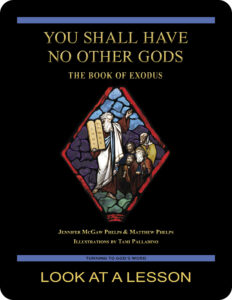 You Shall Have No Other Gods: The Book of Exodus, a 28-lesson Catholic Bible study with an imprimatur, provides an in-depth look at how significant events in biblical history that occurred thousands of years ago to descendants of Jacob remain relevant and even critical for present-day Christians to understand. The deliverance of the Hebrews from slavery in Egypt and the giving of Ten Commandments are examined along with the development of Moses’ relationship to God. Click on the book’s cover to view a sample lesson.
You Shall Have No Other Gods: The Book of Exodus, a 28-lesson Catholic Bible study with an imprimatur, provides an in-depth look at how significant events in biblical history that occurred thousands of years ago to descendants of Jacob remain relevant and even critical for present-day Christians to understand. The deliverance of the Hebrews from slavery in Egypt and the giving of Ten Commandments are examined along with the development of Moses’ relationship to God. Click on the book’s cover to view a sample lesson.
start a Turning to God’s Word Bible study
Thank you for your interest in Sing a New Psalm: Communicating with God Through the Prayers of the Church—Volume I: Lauds & Vespers. 
 More information about beginning a Turning to God’s Word Bible study can be found on this website at start a Bible study, and Tami, Matthew, and I are available to answer questions or discuss concerns. Contact us to start this or one of our other studies or to have your schedule listed with other TtGW study groups on our website. —Jennifer
More information about beginning a Turning to God’s Word Bible study can be found on this website at start a Bible study, and Tami, Matthew, and I are available to answer questions or discuss concerns. Contact us to start this or one of our other studies or to have your schedule listed with other TtGW study groups on our website. —Jennifer
*There are seven deuterocanonical books in the Old Testament—the Books of Tobit, Judith, Wisdom, Sirach, Baruch, and First and Second Maccabees, as well as some passages in the Books of Esther and Daniel. Protestants usually refer to these works as “apocryphal,” a word that means “outside the (Protestant) canon” because they’re excluded from most Protestant Bibles. The word “deuterocanonical” means “second canon”; Catholics use that word to refer to any section of the Catholic Old Testament for which there are no extant, or existing, Hebrew manuscripts. All of the deuterocanonical books appear in the Septuagint, the earliest remaining versions of which date to the 1st century B.C. This Greek translation of the Old Testament was in common use by Jews at the time of Jesus. Learn more by reading How Do Catholic & Protestant Bibles Differ?
Turning to God’s Word printed Bible studies use the 2006 Revised Standard Version Second Catholic Edition (RSV2CE) translation for all Scripture references except the Psalms, which are taken from The Abbey Psalms and Canticles, prepared by the monks of Conception Abbey and published in 2020 by the United States Conference of Catholic Bishops (USCCB). All Scripture links for the online study pages for Sing a New Psalm: Communicating with God Through the Prayers of the Church—Volume I: Lauds & Vespers are to the 1966 Revised Standard Version Catholic Edition (RSVCE) translation. The New International Version (NIV) audio recordings follow the same chapter and verse numbering as the RSV Catholic translations, but the NIV doesn’t include the deuterocanonical passages.
The 1966 RSVCE uses archaic pronouns and verb forms such as “thee,” “thou,” “didst” in the Psalms and in direct quotations attributed to God. The 2006 RSV2CE replaces these with more accessible English. The few significant translation changes in the RSV2CE include rendering almah as “virgin” in the Book of Isaiah 7:14 and restoring the term “begotten” in the Gospel According to John 3:16.
The Psalms in this Bible study reflect numbering used in The Abbey Psalms and Canticles; Psalms numbering may vary in other translations. Numbering also may vary for a few other passages in this Bible study. Turning to God’s Word studies follow the numbering in the Revised Standard Version Catholic translations (RSVCE and RSV2CE). Discrepancies in the New American Bible Revised Edition (NABRE) are noted in the Index of Scripture Citations in the study book and the online sample.
 The companion to this Catholic Bible study from Turning to God’s Word, Sing a New Psalm: Communicating with God Through the Prayers of the Church—Volume II: Vigils, Day Prayer & Compline, will cover Psalms not included in Volume I: Lauds & Vespers. Volume II: Vigils, Day Prayer & Compline is scheduled for publication in 2025.
The companion to this Catholic Bible study from Turning to God’s Word, Sing a New Psalm: Communicating with God Through the Prayers of the Church—Volume II: Vigils, Day Prayer & Compline, will cover Psalms not included in Volume I: Lauds & Vespers. Volume II: Vigils, Day Prayer & Compline is scheduled for publication in 2025.
